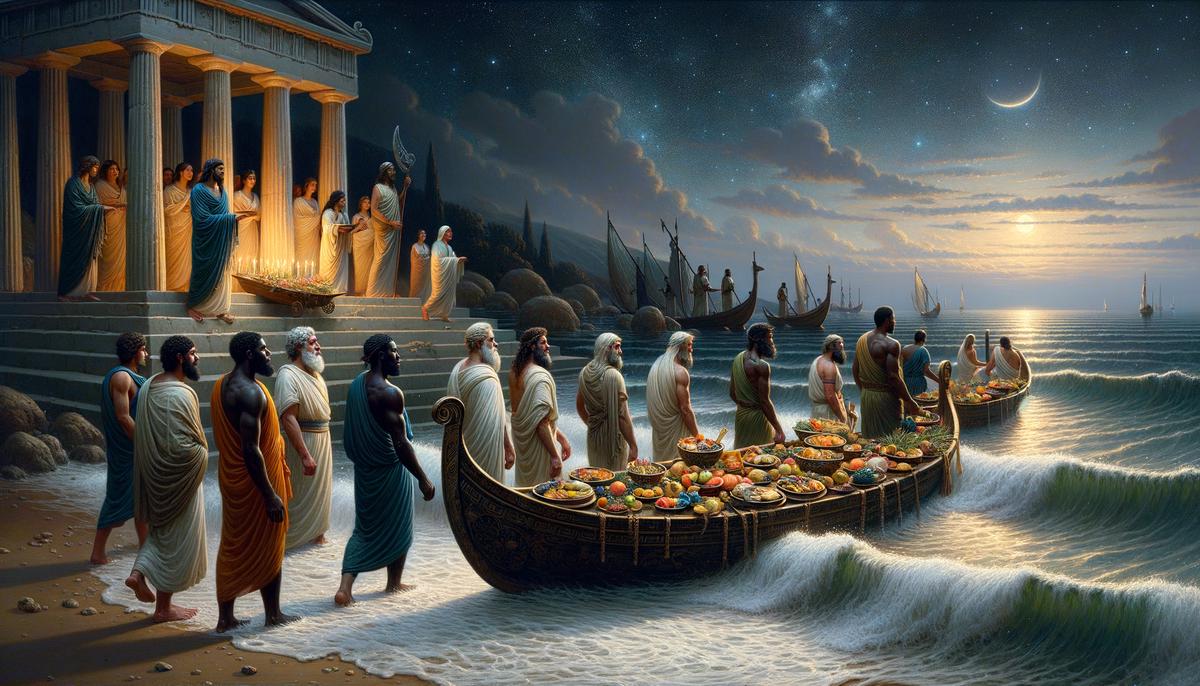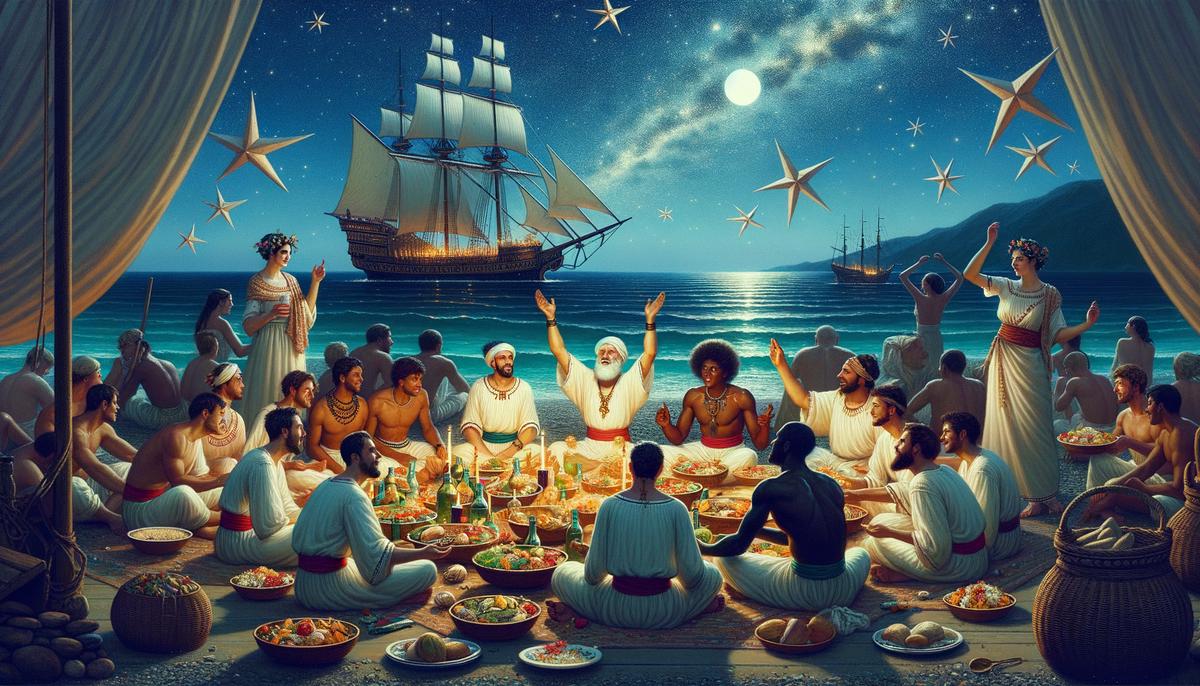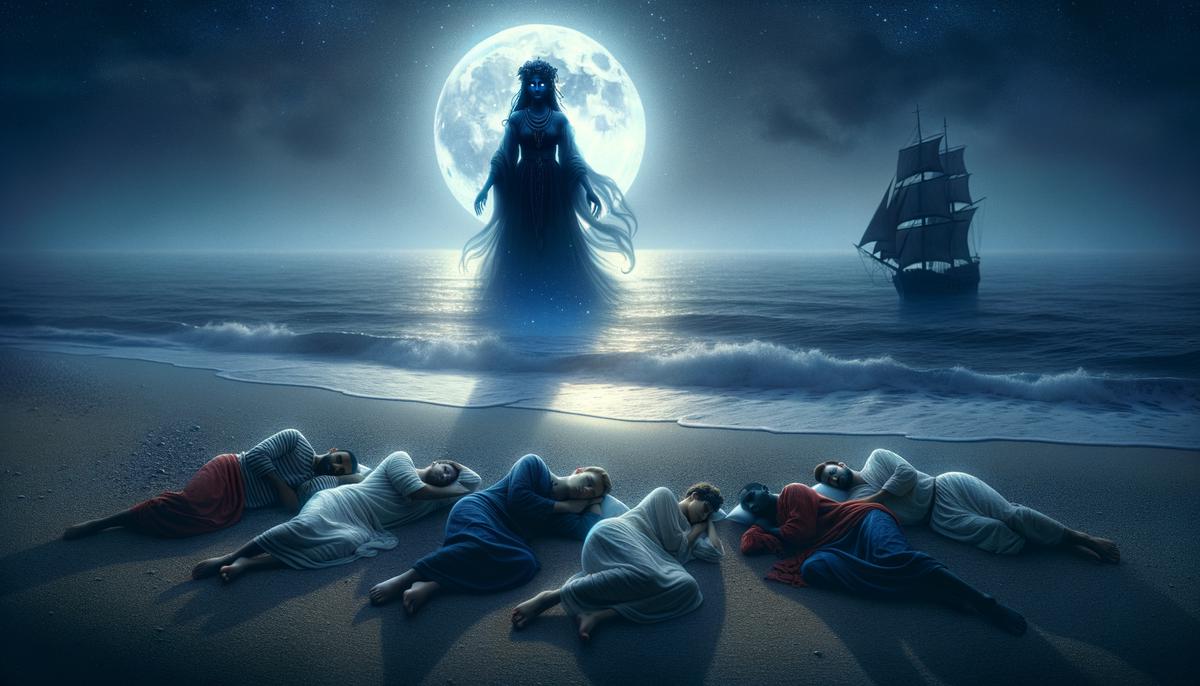Origins and Mythology of Brizo
Brizo, the little-known goddess of sailors, took root in the myths of Delos, an island packed with divinity. Often crowned with the title 'Protector of Mariners,' Brizo had quite the job description: ensuring those braving the vast seas came back to tell their tales.
Her whispers weren't merely to clear skies and calm waters; they bore the weight of dreams. Brizo spoke to the ancient Greeks through their dreams, spinning predictions and messages that sailors would cling to tightly. This unique connection makes you wonder if ancient sleep was just a bit more animated under her watch.
Despite her role whispering vital secrets to mortals, Brizo preferred not to hog the spotlight. Her followers, on the other hand, went all in, throwing her regular banquets under the stars—table set for one whether Brizo showed up in spirit, or just spiritually.
Specific rituals carried out in her honor involved preparing intricate meals that remained untouched by human hands. Sailors left these libations adrift on tiny boats, hoping they'd reach Brizo and appease her—kind of like sending a message and hoping it's been delivered.
Beyond aiding navigators, Brizo also dabbled in fishery affairs. Her essence ensured hearty catches and full nets; no fancy fish finders needed, just divine intervention.
Given her shadowy background in our mythology texts, peeling back the layers on Brizo feels a bit like playing detective—only your clues are steeped in saltwater and ancient whispers. She acts as a reminder that not all influential gods and goddesses were spotlight lovers; some preferred their powerful plays from behind the dreamy veils of a sleeper's mind.

Symbolism and Worship
Dreams are Brizo's domain, and as Agent of Prophetic Sea Whispers, she carries significant weight in the watery world of symbols. Deemed important enough to whisper fate itself, dreams were her way of connecting directly with sailors. This suggests a labyrinth of subconscious cues and signals, resonating with the ever-challenging, ever-changing seas.
The most prevalent symbols linked to her were the small ship offerings—precious miniatures artfully cast into the sea. These vessels were literal and metaphorical; carriers of hope designated strictly for Brizo. They symbolized the promises and secrets of tomorrow whispered into the welcoming ears of the open water. Water represented her embrace, encompassing the very souls it nourished and guided.
The festival dedicated to Brizo, known as the Brizomenia, was almost celestially serene in its nocturnal offering. Picture a star-strung beach at midnight, sounds of laughter mingling with the rhythm of rolling waves. Each sailor or devoted family would bring forth delicately crafted dishes reserved strictly for their divine protector. Brizo never actually attended any of these hearty feasts; divine platforms don't require consuming calories.
For the participants of these enchanting nights, it wasn't just about offering extra fish; it was an unloading of worries, desires, and predictions sealed within a hopeful feast. In placing their trust into her hands, sailors and fishers fostered a communal optimism, a spiritual solidarity—a powerful binding spell which likely explains the high spirits enlisted on return trips.
Reverence soared from these festivities precisely because they tapped into something urgent—a shared understanding that between the terrors of Greek seas and the solutions from Brizo's realm, connection lay in heartfelt rafts draped with dream-catching nets.
Between dreams and delicate delights, Brizo captured minds and hearts with an ease only a dream-weaver could muster. Now you're in on one more secret from the watery whispers of mythology.

Brizo's Influence on Culture
Brizo wasn't just a fleeting fancy in the Greek pantheon; she left ripples through time that even today touch our culture's shores. By influencing ancient perceptions of the cosmos and human destiny, Brizo wove her essence into the fabric of societal values and artistic expressions. Ancient Greek art often alluded to her divine interventions. Frescoes in temples might not headline every history textbook, but those in the know can spot the subtle nods to a ship delicately floating or dreams depicted in ethereal wisps—her fingerprints lovingly pressed into the plaster.
Fast forward through millennia, and you'll detect Brizo's whisper amidst modern narrative and culture. She sails through contemporary literature where themes of fate and guidance rule the waves of plot. Even in today's tech-reliant world, authors and dream-catchers alike metaphorically toss their paper boats loaded with hopes into the digital seas, waiting for a sign from their own Brizo.
In artworks too, the echo of her legacy can be sensed. Look closer at maritime paintings or installations focused on marine adventures, where every wave and shadow might hint at the Goddess' lingering watch. Modern sculptors inspired by Greek mythology sometimes meld her story with eco-conscious narratives—protecting sailors now translates well to conserving our oceans, making her an unsuspected mascot for the environmentally aware seafarer.
Brizo's influence even dips its toes in pop culture:
- Film festivals celebrating seafaring epics or dream explorations: here often lies indirect homage to her domains of the subconscious and the sea.
- Boutiques where Brizo-inspired jewelry featuring miniature ships or dream-catcher designs enchant those who might never know the legend but can't help but feel connected.
As culture evolves, so does the understanding of this dream-weaving deity's scope—fueling a dialogue between ancient mythic elements and modern motifs. A goddess from the ancient scrolls influencing trends or engaging the eco-conscious discussions around saving our oceans with something akin to ancient celestial stewardship.
In this light, Brizo isn't just a footnote in mythology but has commandeered a continuing chapter, her legacy helping to steer us toward a deeper connection with the environment and the enigmatic world of our unconscious. As humans still face the storms of existence and seek guidance amid life's waves, Brizo remains a beacon across these temporal tides—some divine influencers never go out of style.

Comparative Mythology
Just as Brizo whispers through the waves to guide Greek sailors, other cultures boast their own sea deities, whose domains churn with equally fascinating myths and divine duties. Let's sail across the sea of mythology to meet some of these beings, comparing and contrasting their celestial seafaring resumes.
Take for instance the Norse sea god, Njord, a key deity in Scandinavian folklore. Both Njord and Brizo proudly bear the mantle of protector of mariners, but that's where the similarities end. Njord also presides over wealth and fertility, bringing fish and prosperity to those dedicated enough to appease him. Brizo, on the hand, doesn't distribute fish; instead, she doles out dreamy prophecies. Sailors pray to both under tumultuous skies, but you'd toss a coin into Njord's lap for wealth, while scribbling your dreams in a wet notebook for Brizo.
Venturing further east, we encounter Matsu from Chinese mythology, a goddess fiercely guarding those braving the China seas. Unlike Brizo, who subtly infiltrates dreams, Matsu takes a more hands-on approach with epic storm-stopping powers1. Her followers amass by the thousands during temple festivals, a bit louder and crowded than feeding serene dishes by the midnight seas of Brizomenia. Despite these opulent displays, like Brizo, Matsu's divine connection with her people stitches a communal tapestry woven through respect and spiritual interdependence.
Towards the warmer currents of Polynesia floats Tangaroa, the Maori god of the sea. With a role encompassing creation itself, Tangaroa's canvas is broader than Brizo's—managing all marine life and activities2. Brizo's offerings are intricately prepared dishes floating out to sea in little ships, whereas offerings to Tangaroa might include entire canoes dedicated during special building ceremonies. Despite these differences, both deities foster a sense of stewardship and respect for the sea's vast powers.
Each of these divine guardians showcases unique attributes that reflect their respective cultures' geography, values, and societal needs. While Brizo is comfortably ensconced in the quiet realm of dreams and subtle hints, deities like Njord, Matsu, and Tangaroa demonstrate that the role of a sea god or goddess can be as varied as the oceans are deep. From storm queller to wealth bringer, the spectrum of divine maritime job descriptions offers a fascinating glimpse into how different people envision and interact with the beauty of the world's waters.
So next time you're scribbling a note to toss into the vast blue or merely dreaming of maritime adventures, remember these mighty protectors who still sail through the lore of their lands. Each has molded their waterscapes differently, stitching sea and sky into vibrant cultural threads—the offshore breeze to fill our mythological sails.
- Boltz JM. In and Outside the Square: The Sky and the Power of Belief in Ancient China and the World, c. 4500 BC – AD 200. Berlin: De Gruyter; 2019.
- Craig RD. Dictionary of Polynesian Mythology. New York: Greenwood Press; 1989.

Leave a Reply